Pisang Peak Climbing
Challenging and rewarding adventure that takes you through stunning landscapes
 Destination
Destination  Difficulty
Difficulty  Max. Altitude
Max. Altitude  Activity
Activity  Start/End Point
Start/End Point  Best Season
Best Season  Group Size
Group Size  Transportation
Transportation  Activity Per Day
Activity Per Day Nepal is the land of mountains and peaks where you can have abundant peak climbing activities or expeditions. Pisang Peak Climbing in Nepal via Peregrine Treks can be fascinating. We have designed the itinerary with the expert help of the company’s Sherpa Peak Climbers Guide, focusing on safety as well. The peak stands tall above the Pisang village and the green yak pastureland in an inclination of ice and snow to the pyramid summit. It is regarded as one of the most accessible climbing peaks among lots of trekking peaks in Nepal.
While reaching out to the base camp via Pisang Village, ascending the trail, we should pass sparsely placed woods and pasture. Kharka situates at 4380m, the best place for climbers and trekkers to set their base camp. This accessible climbing peak’s high camp is at 5400m, which can be set once the climbers climb to the shoulder at the Southern West Ridge of Pisang Peak. The snow bulk will be there in High Camp in November and March-end. The steep snow slope in well-defined ridges takes to the final summit, which is not strenuous. Descending the peaks and mountains is considered more dangerous than climbing, but Pisang allows you to have a smooth descent from the same route.
For trekking: we provide you with a fully experienced trekking guide. Every five members get one assistant guide and also one porter for every two members.
For Pisang Peak climbing: We provide a license-holder English-speaking climbing guide. We also provide an assistant guide for every five members in the case of a big group. Experienced cooks and necessary Sherpa will go in your group, mostly assistants who will assist in setting up camps during the climb.
This arrangement of staff ensures the safety of every member of the group. If any member becomes sick, our trip will continue with our planning. Please note that the maximum number of members in a group will be 12, an optimum size for a successful trip.
Book this fantastic and easy trekking peak Pisang climbing with Peregrine Treks and Expedition team. We will always work towards achieving successful and safe peak climbing in Nepal.
Upon your arrival at Tribhuvan International airport, our impeccable representative will welcome you and accompany you to your hotel. He will briefly introduce the trip so you can get your journey started on the right foot.
The rest of the day is yours to do as you, please. Take some time to relax and unwind in your new surroundings, or take a stroll through the bustling Thamel bazaar, exploring its winding streets and sampling the local cuisine.
As the sun sets, join us for a sumptuous welcome feast at the hotel, where you will have the opportunity to connect with your fellow travelers and set the tone for the adventure of a lifetime.
Meal: welcome dinner
Accommodation: 3-star hotel
Altitude: 1400 m
The second day of your journey shall be spent traversing the enchanting city of Kathmandu. This city boasts a rich history and culture, with UNESCO Heritage Sites such as the Pashupatinath temple and Swayambhunath being some of its illustrious highlights.
Kathmandu is a treasure trove of hidden gems, and while we cannot cover all of them in a day, we will do our very best to leave you enamored with as much as possible. The city has many must-visit spots, such as the majestic Pashupatinath, the serene Boudhanath, the mystical Swayambhunath, the regal Basantapur, and many more.
The city also houses many ancient monuments and artifacts, each with a story to tell. Apart from soaking in the city’s rich cultural heritage, you will be gearing up for the challenging Pisang Peak Climbing and working on vital paperwork.
Meal: Breakfast
Accommodation: 3-star hotel
Altitude: 1400 m
Today marks the beginning of your epic Pisang Peak journey! Rise and shine early morning and fuel up on a hearty breakfast.
As you leave behind the bustling city of Kathmandu, breathe in the fresh air and take in the sights and sounds of the Prithvi Highway. Along the way, the Trishuli river rushes past, its banks teeming with life and breathtaking scenery that will leave you speechless.
As you journey on, quaint settlements and towns dot the landscape, each one offering a glimpse into the local culture and way of life. The Marshyangdi River beckons you onward, winding through rolling hills and majestic mountains that seem to touch the sky.
After a winding journey through the rugged terrain, your eyes finally behold Chamje – a quaint hamlet nestled in the heart of Marsyangdi Valley.
Meal: Breakfast, Lunch, and Dinner
Accommodation: Lodge
Altitude: 1410 m
Driving time: 8 to 9 hours
As the first rays of the sun filter through the trees, you will embark on a thrilling journey from Chamje to Dharapani. You will begin your day with a nourishing breakfast, ready to take on the challenges ahead. Today’s adventure includes crossing several suspension bridges, which adds a thrilling element to your experience.
Leaving the charming village of Chamje behind, you will step onto a sturdy bridge spanning the majestic Marshyangdi river. The trail will take you through stunning terraced farms of the Manang Region, where you can soak in the beauty of the countryside.
The path ahead may be challenging with steep and rocky terrain, but you will finally reach Tal and Karte, where you will have your lunch. As you journey on, you will come across a prayer wheel reminding you of this land’s spiritual significance. You will continue to trek up and down hills, persevering until you finally arrive at the picturesque Gurung village of Dharapani, where you will rest for the night.
Meal: Breakfast, Lunch, and Dinner
Accommodation: Lodge
Altitude: 1860 m
Trek time: 5 to 6 hours
As you embark on your journey today, your destination is Chame, which lies ahead of you from Dharapani. As you pass through a village and witness the remote lifestyle of the locals, you will gradually begin to ascend toward Bagarchhap, a quaint Tibetan-style village.
Upon leaving Bagarchhap, you will enter a stunning forest of rhododendron, adding to the natural beauty of your surroundings. Following the forest, you will walk alongside the Marshayangdi river all the way to Koto, the gateway to the renowned Nar Phu valley. The remainder of the journey from Koto to Chame is relatively easy, leading you to the main administrative center of Manang.
As you end your day’s journey in Chame, take some time to relax and refresh yourself for the adventures that lie ahead.
Meal: Breakfast, Lunch, and Dinner
Accommodation: Lodge
Altitude: 2650 m
Trek time: 7 to 8 hours
Today you will begin your trek by making your way toward Bharatang. You will follow the scenic trails alongside the serene Marshyangdi River as you reach your destination. You will then cross a suspension bridge over the river and gradually ascend through the trails until you reach Dhikur Pokhari.
As you enter an enchanting coniferous forest, you will pass through a small settlement of people and eventually arrive at Pisang. This quaint village is located on the banks of the Marshyangdi River and offers breathtaking views of the majestic Pisang Peak and Annapurna II.
Enjoy a night’s stay in Pisang and soak in the tranquil ambiance of this charming village before continuing your journey.
Meal: Breakfast, Lunch, and Dinner
Accommodation: Lodge
Altitude: 3300 m
Trek time: 5 to 6 hours
During the seventh day of your expedition, it is essential to take some time to acclimatize in Upper Pisang. Acclimatization is crucial when reaching high elevations, as it helps your body adjust to the current climatic conditions and prevent altitude sickness.
After breakfast, wear your climbing gear and rehearse climbing in nearby spots. This will allow you to gain confidence and ensure you are well-prepared for the rest of your journey. Additionally, you can take some time to explore the beautiful village and learn about the local culture and traditions.
Upper Pisang offers stunning views of Mt. Gangapurna, Annapurna, and Tilicho Lake, making it a must-visit destination on your trip.
Meal: Breakfast, Lunch, and Dinner
Accommodation: Lodge
Altitude: 3300 m
Today, after a delectable breakfast to fuel your body, you bid farewell to the quaint village and commence your trek towards the Pisang Peak Base Camp.
The breathtaking scenery will leave a profound impression as you navigate the lush forest. The tranquil Kharka greets you, offering all the necessary amenities for a comfortable camping experience. The stunning landscape and valleys leave an indelible mark on your memory.
As you advance toward the base of Pisang Peak, your anticipation can heighten. You will be spending the night here, preparing for the upcoming climb.
Meal: Breakfast, Lunch, and Dinner
Accommodation: Lodge
Altitude: 4380 m
Trek time: 4 to 5 hours
As you embark on your journey today, the destination is Pisang Peak High Camp. The ascent will be approximately 1000 meters, requiring a few hours of trekking from the Base camp.
The trail will be challenging, with many steep inclines and narrow pathways demanding your attention. Once you arrive at High Camp, you can prepare for the forthcoming Pisang Peak Climbing expedition.
Before the climb, the experts will conduct thorough checks to ensure everyone is acclimatized and ready to reach the summit. You may choose to explore the area or take some time to rest and prepare yourself for the big day ahead.
You will be spending the night at High Camp, surrounded by breathtaking views and the thrill of anticipation.
Meal: Breakfast, Lunch, and Dinner
Accommodation: Lodge
Altitude: 5400 m
Trek time: 3 to 4 hours
Today’s itinerary presents an exciting opportunity for an adventurous journey. The much-awaited day has finally arrived, and you will embark on a trek to submit Pisang Peak. As you make your way toward the summit, feeling a sense of anticipation and excitement is normal.
The path to the summit involves traversing a ridge and making your way through a final snow slope. It is essential to exercise caution during this climb, as the terrain is both technical and steep. Your guide will secure the rope and lead you toward the summit to ensure your safety.
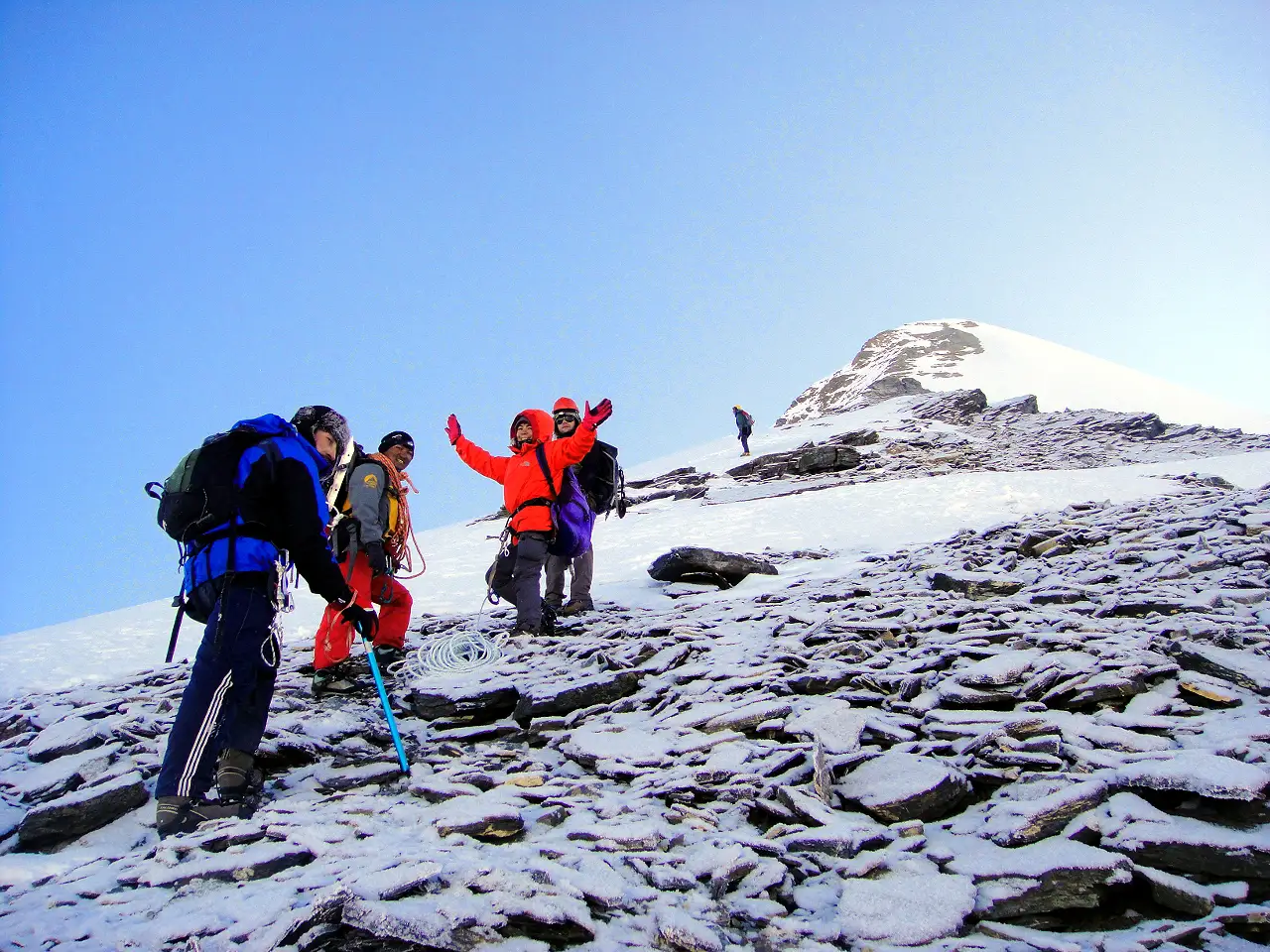
Scaling the summit can evoke a mixed sense of anxiety and joy. At last, after surmounting all the obstacles, you reach your destination. The unique sense of accomplishment lingers long after this experience.
From the pinnacle, one can behold the breathtaking vistas of Mount Annapurna and the imposing Glacier Dome. After capturing the fascinating sights, it is time to head back to the Base Camp for an overnight stay.
Meal: Breakfast, Lunch, and Dinner
Accommodation: Lodge
Altitude: 6091 m
Trek time: 7 to 8 hours
The itinerary for the journey includes a contingency day, which allows for any unforeseen circumstances that may arise during the trip. This provision accounts for possible changes to the schedule due to inclement weather conditions at the summit, injuries, altitude sickness, or other unexpected incidents.
In the event that everything goes according to plan, this additional day can be utilized to explore nearby viewpoints towards the end of the route or at the end of the journey.
Overnight accommodation will be provided at Pisang Peak Base Camp.
Meal: Breakfast, Lunch, and Dinner
Altitude: 4380 m
Descending from higher elevations is generally considered easier than ascending, making today’s trek relatively easy despite its length. Along the way, you will pass through the remote Upper Pisang village before continuing to the quaint Dharapani village, where you can say goodbye to the friendly locals and soak up the stunning views.
Your journey will ultimately lead you to Chame, which boasts several lodgings with modern facilities. Please take full advantage of Chame’s hot showers, internet access, and other modern amenities, and enjoy a comfortable overnight stay at one of its many lodges.
Meal: Breakfast, Lunch, and Dinner
Accommodation: Lodge
Altitude: 2650 m
Trek time: 7 to 8 hours
Once breakfast is finished, a bus will transport us to our destination: Kathmandu. As we depart from the Marshyangdi Valley, the magnificent views of the Himalayas will be sorely missed. The first part of the journey will be on harsh and dusty roads, but the conditions will improve as we continue our route.
Upon arrival in Kathmandu, a transfer will take you to your hotel. After some time to refresh, there will be an opportunity to explore the evening market at Thamel. The market is perfect for souvenir shopping, and you may also visit a local pub with your new friends from the trip and climbing team to experience your final day in Nepal. The day will culminate with a farewell dinner. The overnight stay will be at a hotel in Kathmandu.
Meal: Breakfast and Farewell Dinner
Accommodation: 3-star hotel
Altitude: 1400 m
Driving time: 9 to 10 hours
Your Nepal adventure draws to a close as today you will depart to your homeland. Early morning, our team will transport you to the Tribhuvan International Airport, where you will be dropped off at the terminal before bidding us farewell. As you embark on your journey home, you will undoubtedly reflect on your unforgettable experiences in the stunning Annapurna region. Pisang Peak’s summit and the surrounding mountains’ breathtaking views will remain etched in your memory for years.
Meal: Breakfast
During your stay in Kathmandu, we offer comfortable accommodation in deluxe 3-stay hotels, with a delectable breakfast included. We aim to provide you with a personalized experience tailored to your preferences. Please inform us if you require any special arrangements. For those seeking a more luxurious stay, we also have a selection of 4 and 5-star hotels available in Kathmandu.
Accommodation is based on two single beds to be shared, with solo travelers being paired with someone of the same gender within the group. If you desire more privacy, we offer an option to upgrade to a single room for an additional $200.
As you embark on your trekking adventure to Pisang Peak, you will have the opportunity to experience the unique accommodations local teahouses offer. These charming establishments provide basic rooms with twin beds; those who prefer a single room can request one for an additional fee. You will be pleased to find that the teahouses have comfortable mattresses, cushions, and amenities such as electric blankets and hot and cold showers. While Wi-Fi is available at most teahouses at an additional cost, certain remote areas may have limited connectivity.
Meals
While residing in Kathmandu, you will have the pleasure of partaking in a welcoming dinner upon arrival, followed by a farewell dinner as you depart. As for your Pisang Peak Climbing expedition, all meals, including breakfast, lunch, and dinner, will be graciously served throughout your journey.
Additionally, teahouses in Nepal offer a delightful culinary experience for travelers seeking a balance of nutrition and taste. One of the most popular dishes is the traditional Nepali meal, Dal Bhat Tarkari. This dish comprises a blend of rice, lentils, pulses, and vegetables, providing a balanced set of nutrition for a healthy diet.
Teahouses also offer a range of Western dishes like toast, noodles, pizzas, burgers, and more, which are available on their guest house menu.
Customize this trip with help from our local travel specialist that matches your interests.
We accept major currencies such as the US Dollar, the Great Britain Pound, the Euro, the Australian Dollar, the Singapore Dollar, the Indian Rupee, the Swiss Franc, the Canadian Dollar, the Japanese Yen, the Chinese Yuan, the Saudi Arabian Riyal, the Qatari Riyal, the Thai Baht, the UAE Dirham, the Malaysian Ringgit, the South Korean Won, the Swedish Kroner, the Danish Kroner, the Hong Kong Dollar, the Kuwaiti Dinar, and the Bahrain Dinar.
Type C, D, and M power plugs and sockets are used. The standard voltage and frequency are 230 V and 50Hz, respectively.
Vaccinations You must be completely vaccinated against COVID-19 at least 14 days before traveling to Nepal. Vaccination documentation is required.
On Arrival Visas are available at Nepal's entrance points for travelers. Travelers from Nigeria, Ghana, Zimbabwe, Swaziland, Cameroon, Somalia, Liberia, Ethiopia, Iraq, Palestine, Afghanistan, and Syria, on the other hand, are required to obtain a visa through their nearest Nepalese diplomatic post (embassy/consulate).
To confirm the trek/tour package, we want a deposit of at least 20% of the total tour/trek fee. The remaining balance must be paid when you arrive in Nepal. We take Visa, Maestro, MasterCard, American Express, and other major credit cards. The total cost of a Bhutan and Tibet tour must be paid in full at the time of booking.
We strongly advise you to purchase a SIM card for reliable internet access throughout Nepal. Nepal Telecom (owned by the government) and NCELL (owned by the private sector) are the two main SIM card providers in Nepal. It is preferable to get a SIM card at an airport, where staff will assist with activation and data plan purchases. If you have a SIM card, it will be easier for you to contact us and locate our airport agent.
You can charge your electrical devices at hotels and lodges because there are no power outages. In the Himalayan region, however, hotel owners may levy a nominal fee.
This remarkable ascent is ranked moderate in difficulty and entails a lengthy and arduous hike lasting between 7 to 9 hours in an isolated and secluded region. Although it may seem daunting to novice climbers, our knowledgeable and courteous guide will be present to offer valuable advice and techniques to help you conquer this majestic summit.
While previous experience in alpine climbing can be advantageous, it is not an absolute requirement. However, it is essential to possess a certain level of physical fitness as climbing to the 5,400m high Camp and the 6,091m Pisang peak can be challenging. Still, it is reassuring to know that no technical maneuvers are necessary.
Suppose you possess the appropriate level of fitness and experience trekking at high altitudes and a solid desire to summit your first Himalayan peak. In that case, this mountain is an ideal challenge for you.
Whether you are a novice or an experienced climber, Pisang Peak can be conquered throughout the year. However, if you want to increase your chances of success and enjoy the best weather conditions, planning your climb during the spring (March to May) or autumn (September to November) seasons is recommended.
During these times, the climate is mild and stable, with clear skies and comfortable temperatures (0 to 17 degree Celsius) throughout the day. This makes it easier to navigate the steep terrain and reach the summit without facing any extreme weather conditions. Moreover, the picturesque landscapes and beautiful views of the Himalayan range make the climb even more memorable and enjoyable.
Climbing Pisang Peak during the winter season from December to February can be a rewarding experience if you are adequately equipped for the cold weather conditions. Despite the harsh conditions and snowfall at the high elevations of the base camp and the summit, the stunning views of the mountains are unparalleled during this time of the year. Additionally, the reduced number of tourists in the winter season allows climbers to enjoy the beauty of the mountains without any distractions.
Likewise, exploring the trails during the monsoon and summer, spanning from June to August, can present a thrilling challenge for even the most experienced hiker. The incessant rainfall during this period renders the paths slippery and increases the risk of encountering leeches and cloudy days. However, this time can also be the perfect opportunity for adventurers seeking to conquer the majestic Pisang Peak. With the proper gear and preventive measures, hikers can bask in the breathtaking views of the surrounding natural beauty while experiencing an adrenaline-filled adventure.
Our tour is available throughout the year, and we ensure that the best safety measures are in place. Therefore, you can plan your trip any time of the year with complete peace of mind.
The Pisang peak climbing itinerary calls for carefully considering Acute Mountain Sickness or altitude sickness. This is a severe condition that can pose a threat to your well-being when ascending to higher altitudes too rapidly. As you climb higher, oxygen levels in the air decrease, with a 50% drop at altitudes above 5000 meters compared to sea level. For this reason, it is necessary to acclimatize to the lower oxygen atmosphere, which our bodies require a day to adjust to.
Our Pisang Peak Climbing itinerary is designed by a team of seasoned travel experts and veteran guides to ensure your safety and comfort during the climb. Our itinerary includes rest, acclimatization days, and pre-climbing training to prepare you for the final ascent to the peak. To prevent Acute Mountain Sickness (AMS), we recommend staying hydrated and avoiding alcohol and smoking.
Our guides have a first-aid kit and pulse oximeter to monitor your oxygen levels throughout the climb. Our guides have over two decades of experience, having successfully led numerous climbers to the summit of Pisang Peak. They have trained in wilderness first aid and crisis management and are prepared to handle emergencies.
If you experience symptoms of AMS and need to descend to a lower elevation, our assistant guide will accompany you and follow strict safety protocols. We prioritize your well-being and will closely monitor your condition to ensure a safe and memorable climbing experience.
Pisang Peak is located in the Annapurna trekking area of Nepal, to the north of Manang valley and above Pisang village. It is a popular destination for those who enjoy trekking, climbing, and the beauty of mountains. Those seeking an adventurous mountaineering experience can summit Pisang Peak as part of the well-known Annapurna Circuit Trek.
Below is a comprehensive list of equipment we strongly recommend visitors bring along when planning a visit to Pisang peak.
NB: This equipment is available for rent at Thamel, Kathmandu, at affordable prices.
Before ascending to Pisang Peak, obtaining a travel insurance is essential. Ensuring that your travel insurance policy covers all the activities and elevations, you will experience on your journey is crucial. As you will reach a height of 6,019 meters, your insurance should provide coverage up to that point, including the cost of a helicopter evacuation and hospitalization in the event of an unforeseen accident or medical emergency.
As Nepal’s leading trek and tour operator, we pride ourselves on our extensive experience and trustworthiness. Our team includes expert mountain climbing guides and porters with a wealth of knowledge about the local terrain. All our guides and porters are licensed by the government, fully equipped, and fluent in English, ensuring that you have a safe and enjoyable trekking experience.
To climb Pisang Peak, three permits are needed: the ACAP permit for Annapurna Conservation Area Project, the TIMS Card for the Trekkers Information Management System, and the Pisang Peak Climbing Permit. These permits will be arranged before you arrive in Kathmandu.
To climb Pisang Peak privately, you must reserve a private climb. If you choose to book a private climb, we will create a personalized itinerary for you. Climbing Pisang Peak individually is not permitted – it is required that you book through a government-registered travel company like Peregrine.
We offer various payment methods, including bank transfers, money transfers, online payments, and credit cards. You can choose the option that is most convenient for you. However, according to our policies, a 20% advance payment is required to confirm your booking.
Based on 10 Reviews

Excellent
I went on a sick adventure climbing Pisang Peak with Peregrine last year. I did my homework and researched the crap out of all the trekking companies. But Peregrine was the real deal. They took safety seriously and had a killer rep. And let me tell you, they did not disappoint. From the moment we got to Camp to when we were crushing it at the summit and coming back down, the team took hella good care of us.
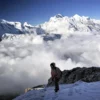
Excellent
I wanted to share my recent adventure to Pisang Peak with you. I spent two amazing weeks in Nepal and had the time of my life. I have to give a shoutout to my guide, who was absolutely fantastic. We had such a great time together, and he even shared some of his own adventures with me. The itinerary was really practical, including pre-climb training and acclimatization at higher altitudes. I was really impressed with how smoothly everything went, and each task was a success. Now, I can’t stop talking about my climb to over 6000 meters. It’s definitely something to brag about! Thanks for listening to my adventure story.
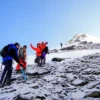
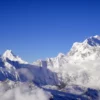
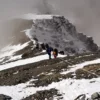
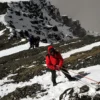

Excellent
The view from the top of Pisang Peak was absolutely incredible! It was so breathtaking that I almost shed a tear. My guide was so kind and supportive, congratulating me on reaching the summit despite the challenges I faced at base camp. With his help, I was able to take a few hours to rest before continuing my climb the next day. Along the way, I had the opportunity to explore some truly beautiful remote villages and connect with the friendly locals. It was an unforgettable experience that I would cherish forever!

Excellent
Let me tell you about my mind-blowing adventure with Peregrine Treks. We took a trip to climb Pisang Peak; let me tell you, it was out of this world! The level of preparation was extraordinary, and our guides were absolutely phenomenal. Not only were they experienced and knowledgeable, but they were also super friendly and made the journey even more enjoyable. Talk about an experience that will stay with me forever!

Excellent
This adventure was out of this world! A million thanks to Peregrine for making it happen!

Excellent
The journey was truly extraordinary and splendid. Many thanks to Peregrine for making it possible.

Excellent
Thanks to the skilled team at Peregrine, we successfully reached the top of Pisang Peak without encountering any major problems. Their leadership, organization, and support were exceptional throughout the entire journey, from the trek to the climb.

Excellent
My experience with Peregrine was exceptional. Their high level of professionalism was evident before the trip even began, as they promptly addressed all of my inquiries and ensured that all necessary paperwork was completed on time. They were also flexible and accommodating when I needed to make changes to my itinerary. However, during the trek and climb, I suffered from altitude sickness and struggled to keep pace. Despite this, Peregrine remained patient with me and adjusted their speed accordingly.

Excellent
I have recently booked with Peregrine for a second time, and it was an unforgettable adventure, which I personally consider to be the best one yet. The warm welcome in Kathmandu, the outstanding city tour, the exciting drive through the scenic areas of Chame and Dharapani, and the excellent trek itself made the whole experience a valuable one to cherish.

Excellent
Pisang Peak offers an awe-inspiring adventure that I highly recommend to anyone seeking an exhilarating experience in Nepal.
The best experience we had with Peregrine was the whole tour of the Annapurna Base Camp Trek was tailor-made for our requirements; all our requests were reviewed, discussed, and accepted and, in some instances, with a better recommendation.
More Reviews